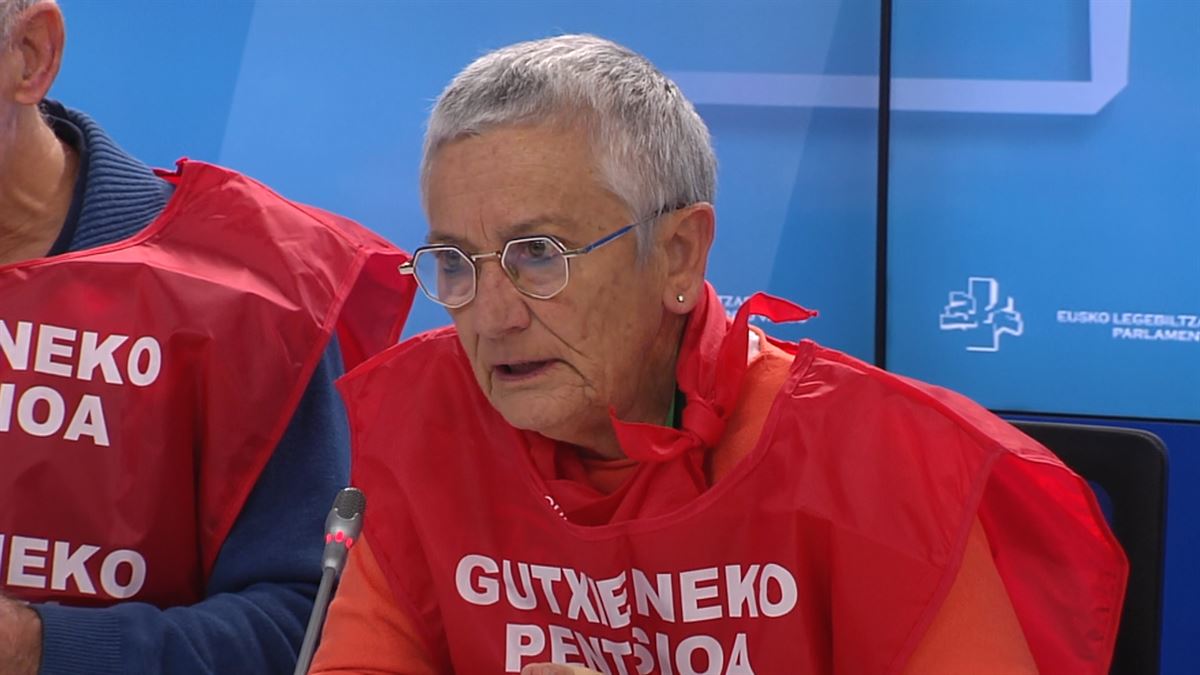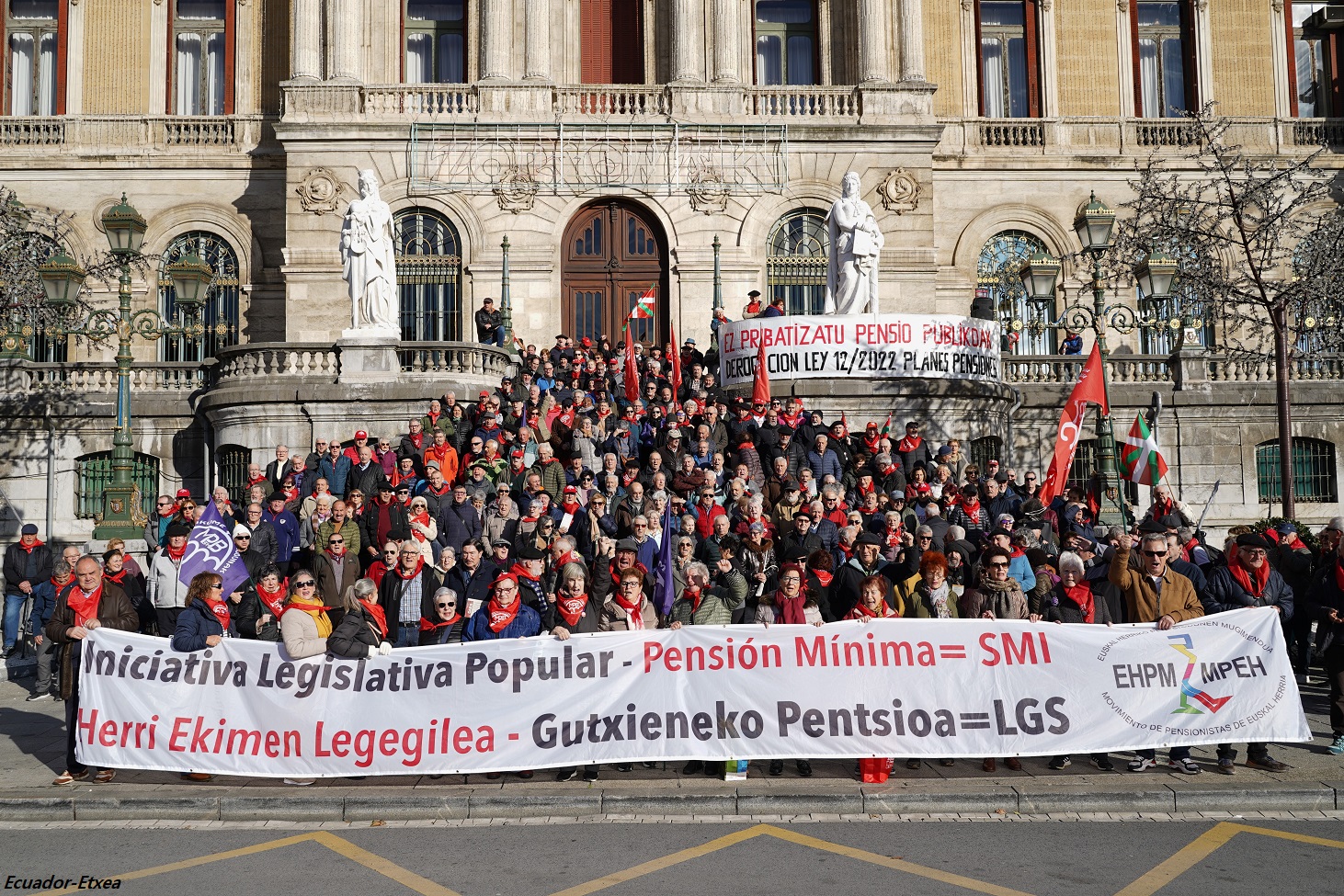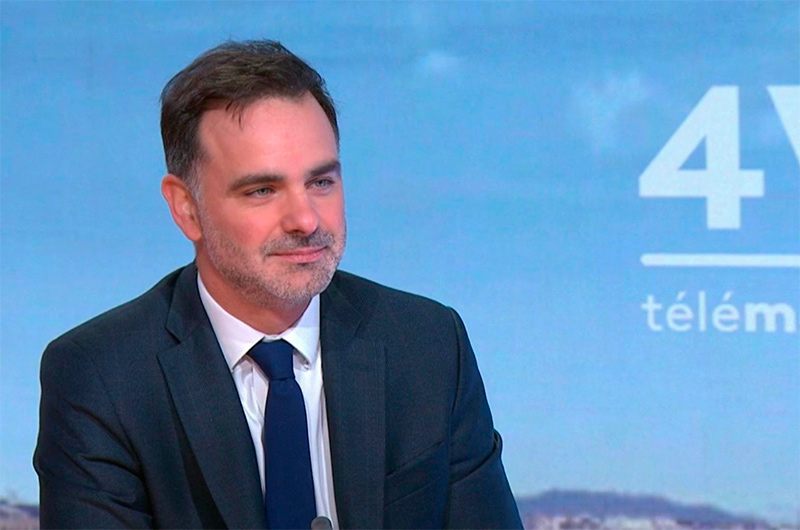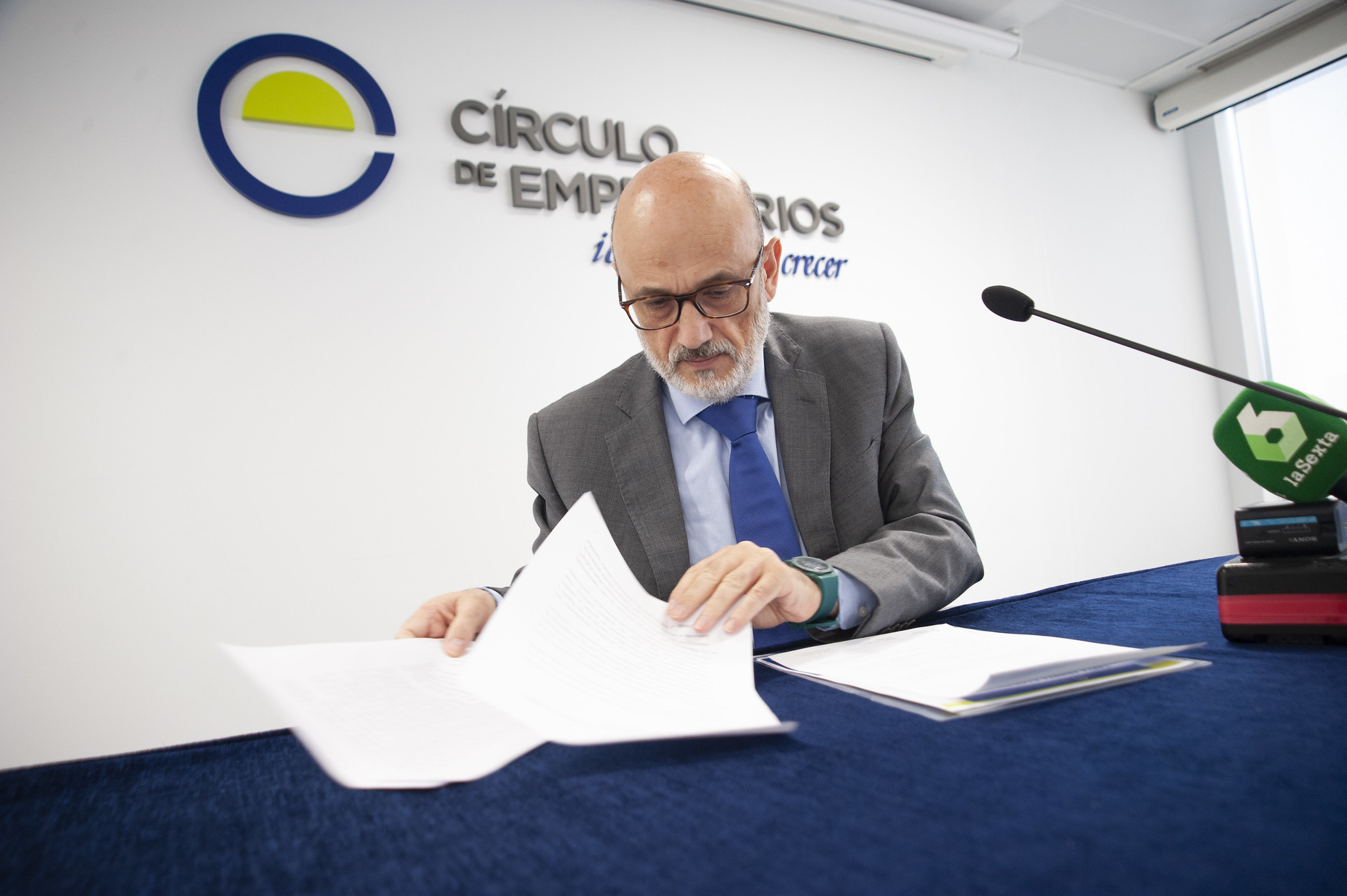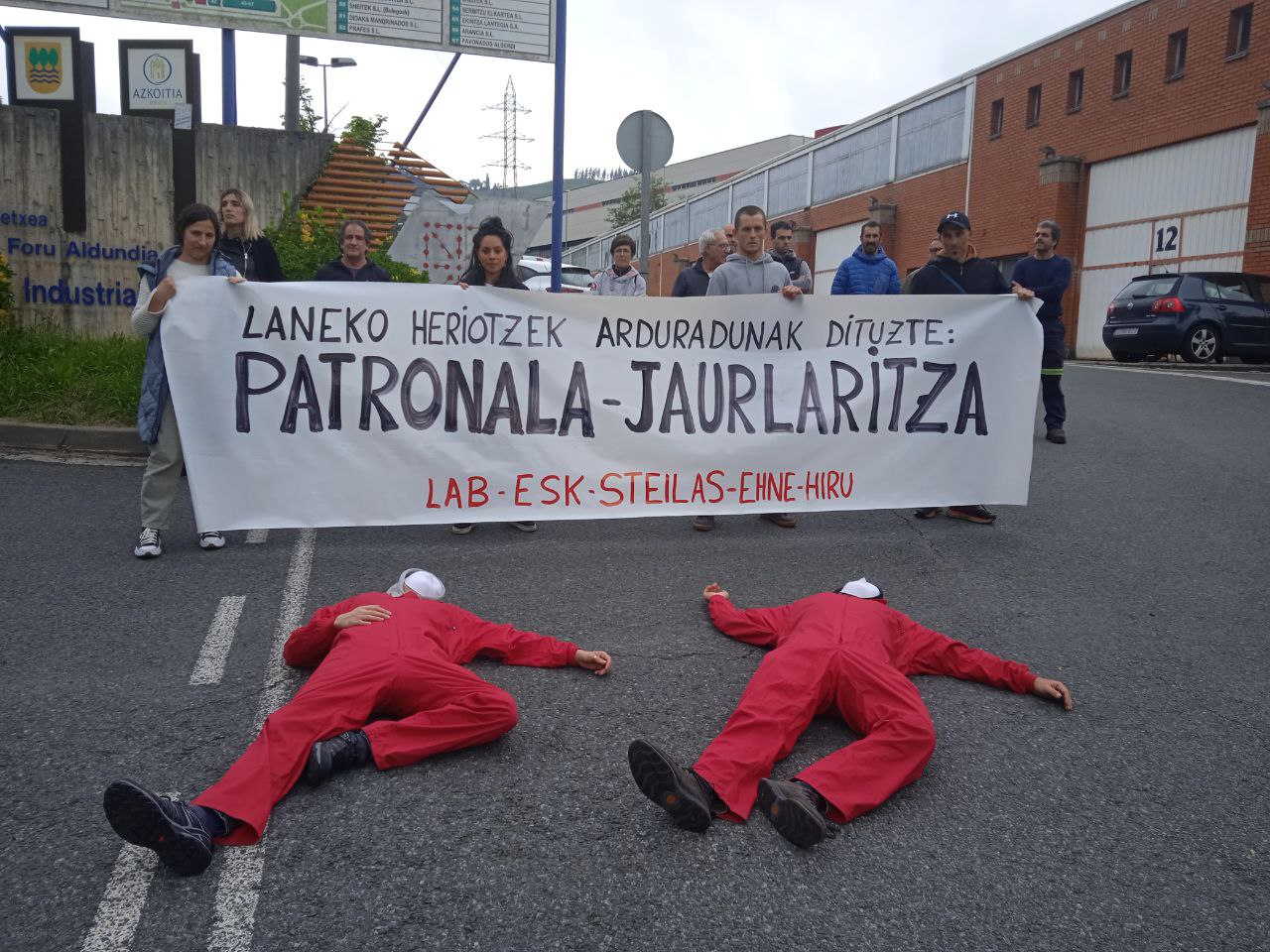A dignified pension: the work of all, the right of all
- Pensioners from Euskal Herria have come out to demand decent pensions. For the fifth consecutive year, the retirees and widows of Hego Euskal Herria will receive an increase in their remuneration of 0.25%. They have insisted on the need for the minimum pension to be set at EUR 1,080, denouncing the poverty situation in which many pensioners are found, mainly women over 65.
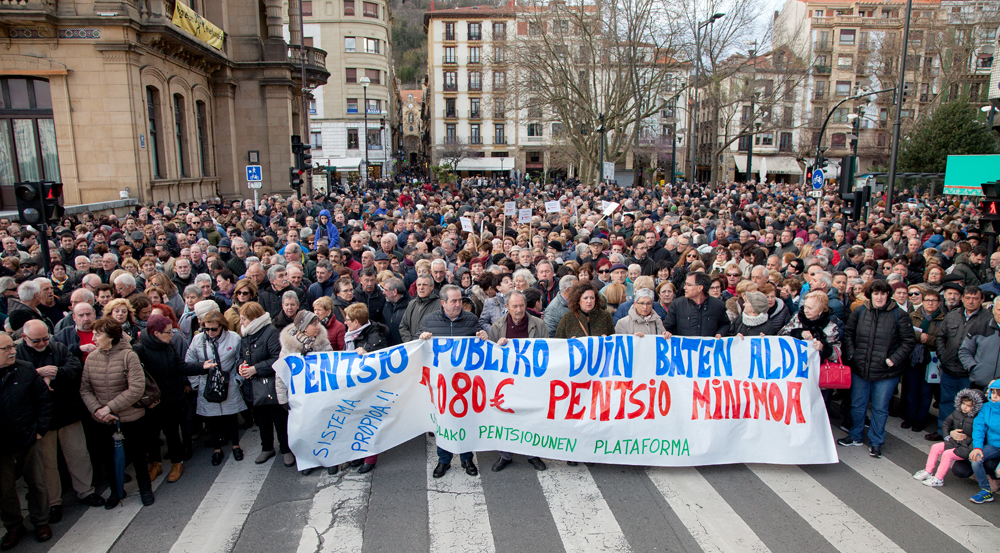
The Spanish Government announced at the beginning of the year the increase in pensions for next year. In particular, the central Government expects that the increase in retiree and widower ' s pay will be 0.25 per cent, which is causing a large gap in this increasingly broad sector of society. However, indignation and unease have not only occurred in pensioners, but government measures have revealed problems added to the low pay rise and are questioning the pension system itself.
As for the December data, 636,000 people are receiving the pension in Hego Euskal Herria. Of these, almost 70 per cent are paid on the basis of contributions, while 165,000 are entitled to a widow ' s pension and 54,000 others are entitled to a disability pension. In total, almost a quarter of the population of Hego Euskal Herria is a pensioner.
The increase in pensions announced by the Government of Mariano Rajoy is the legal minimum of 0.25 points, which is fixed for the fifth consecutive year, according to the law. Therefore, given that the average pension in Hegoalde is EUR 1,134, in 2018 it will be increased by EUR 2,83. As the CPI (Consumer Price Index) is around 1.2%, pensioners will lose purchasing power once again in 2018. Pensioners report that in Ipar Euskal Herria they have also lost purchasing power. They have also been raised with the General Social Tax, the CSG, and in the face of the reforms that the Emmanuel Macron government wants to make to the pension system, the citizens have come to the streets. Pensions in the French state have been frozen since 2014.
The crux of the situation in the Spanish State, however, has managed to mobilise together associations in defence of the rights of pensioners and pensioners. The demonstrations in the Basque capitals have been multitudinous, and the situation of women who have so far done invisible shadow work has also been moved to the centre of the demands, which are the worst.
José Luis Ruiz, of the Association of Retirees and Pensioners of Bizkaia for Democracy (AJPD), says that there was some concern among the people, but he did not imagine the movement that has been shown in the street: “I think pensioners have been scared. With the crisis, people realized that they were losing their jobs and many had to help their children financially. We must not forget that those of us who are now 70 years old had to go out in the street many times as a young man.” This is also maintained by Iñaki Elduaien of the Dignity association: “Our generation has fought in different ways and ways; we were on the street 40 years ago.”
Minimum remuneration for women over 65
Pensioners are calling, as recommended by the European Social Charter, for the minimum pension to be set at EUR 1,080 per month. Based on this figure, the Euskal Herria Pensioner Platform presented a popular legislative initiative in the Parliament of Vitoria-Gasteiz in 2016. The initiative called for additional support for lower pensions to reach EUR 1,080, but with the votes against PNV, PSE and pp the proposal did not succeed.

According to AJPD sources, although this figure has taken the form of a claim, they see a need for a fair reference. Joxe Agustin Arrieta of the Association of Retirees and Pensioners of Gipuzkoa speaks with dignity of the minimum pension: “I don’t know what the amount should be, but the minimum pension has to grow; what we receive has to be dignified.” María Luisa Lizartza of the Dignity Association pointed out that pensions below EUR 1 000 do not guarantee an adequate quality of life for pensioners: “A pension of less than EUR 1,000 is poverty, it is essential to put a decent minimum”.
Currently, in the CAV, thousands of pensioners receive the Income Guarantee Income (RGI) to enjoy their pension. According to data from the Ministry of Social Security, 25% of pensioners in the Community received a minimum pension (EUR 637.7) in 2017, 28% in Navarre. To supplement their pension, the IGR is an example that the largest number of recipients of this income is those over 65 years of age: 10,000 older people.
Among those over 65 who receive Income Guarantee Income (IGR), the majority are women, eight out of ten. Here too, it is women who have the greatest disadvantage. The number of women receiving the minimum pension in the CAV is three men, and according to a study carried out in 2017 by the UGT union, the average difference between the pensions of women and men in Álava, Bizkaia and Gipuzkoa is almost 45%: while men received an average pension of 1,518.85 euros, women received 837,84 euros. These salaries, of course, do not take into account the work carried out in the shadow economy, in the home and in care, and are a sign of the difficulties that many women have had in paying in the past.
Speaking of the gender gap, Armando Aulestiarte of the Arabako Pentsionistak Lantzen group recalls the situation of widows and widows: “Of the 20,000 pensioners receiving the IGR, most are widowed women, they are the ones who receive the lowest pensions.” Nekane Berriotxoa is a member of Dignity and is concerned about the situation of widowed women: “The situation of widows is very bad. Only 52% of their partner's pension is left to the widow, and those who have worked in full at home receive a very low pension. Many widows are left in poverty.”
Nekane Berriotxoa (Dignity)
“The situation of widows is very bad. Only 52% of their partner's pension is left to the widow, and those who have worked in full at home receive a very low pension. Many remain in poverty.”
The problem of pensions has a political dimension.
For the AJPD partnership, the biggest challenge for the pension system at the moment is to make it fair and sustainable. José Luis Ruiz de la Asociación says that the problem of pensions must be analyzed in the political sense, not in the economic sense: “They say the problem is that they pay more than the pension fund receives; that is not a problem, but look back on the situation. First, we should set out what older people need to have a dignified life and then decide how to fund this.”
Economic expert Miren Etxezarreta also places the problem in political terms. Until 1995, the pension fund was part of the Spanish State budget and its modification was also a political decision: “For years they were earned in the pension fund and the money was also used to finance other aspects. Now, when the fund is deficient, you only have to re-link the pension stock market with the state budgets; in the end, it is a social expenditure that is pension spending.” In fact, all social investments in the Spanish State are financed via taxation, except in the case of pensions.
In view of this, the PSOE proposed in January the creation of two new taxes. The Socialists have proposed creating two taxes that would affect banks and financial transactions in order to finance pensions. According to Miren Etxezarreta, the pension system does not need a new tax, it would be enough to allocate the money: “Pensions are funded only by the contribution of active workers. This means that the rest of the State's riches, especially the benefits of capital, do not contribute to the support of the elderly. It is a political decision not to match what remains to be paid for pensions with what is collected from taxes”. It should also be taken into account that in the Spanish State the maximum contribution wage is EUR 3,751; the one earning the most is quoted up to that figure in the current system.

What if we managed pensions in the Basque Country?
The demand for the pension system in Euskal Herria is increasingly echoed by pensioners. “If this is the way the central government works, Navarra wants to manage its pensions,” said the president of the foral community, Uxue Barkos. The debate has also taken place in Araba, Bizkaia and Gipuzkoa. The Gernika Statute of 1979 covers the competence of Social Security, but after almost 40 years, this competence has not been transferred to the Basque Government. Lakua has reiterated the importance of full compliance with the statute of the CAV and the transfer of Social Security as one of its priorities. However, the intention of the Basque Government is not to develop its own pension system once that competition is achieved. The PSE Labour Advisor, Maria Jesús San José, has so far stated that they will not split the single pension fund. The intention of the Government of Iñigo Urkullu is to achieve this competence and "strengthen" the Spanish system, which has already been approved.
The Minister for Finance and the Economy of the Basque Government, Pedro Azpiazu, considers that if the Gernika Statute says that social security is the responsibility of the Basque Government, the transfer of that competence must be complied with. In his view, if the Basque Government had the capacity to raise and pay pensions, it would facilitate coordination with the resources of other social policies. “Managing social security for us would mean doing things better,” according to Azpiazu.
José Luis Ruiz
(AJPD Bizkaia):
“They say that the problem is that the pension fund pays more than it charges; that is not a problem, but looking back at the situation. First, we should set out what older people need to have a dignified life.”
Along the same lines is Joxe Agustin Arrieta from the Association of Pensioners of Gipuzkoa. It places particular emphasis on the importance of the management of social security by the Basque Government and compares it with the management of the different competences that the CAPV Government has had so far: “I believe that over the past 35 years the government has managed well the competences it has had and that has resulted in the well-being of our society. Instead of Madrid, it is important that we manage the money collected through our taxes.”
Beyond that, there are not a few political and social players who are committed to full control of pensions. The Dignity Association, for example, calls for the creation of a Basque system of own pensions. The objective of Iñaki Elduaien in managing the pension system of Hego Euskal Herria is to maintain an equal relationship with the Spanish State: “The Gernika Statute does not guarantee the possibility of having a pension fund of its own. It may be interesting to achieve the competence recognised in the Statute, but the ultimate objective of the Basque Government should be full competition.”
Because for many, if the control of the pension fund remains in the hands of the state, social security would be nothing more than a “window” – using the words of the ELA-syndicate. According to a survey by the Basque College of Economists held in 2017, most Basque economists consider a pension system of their own "viable", according to Rajoy. On the contrary, the unions have linked this possible system of decent pensions to the end of the wage gap and to quality employment; and as long as they do not exist, LAB has proposed to the Basque Government to set up a fund to compensate for minimum pensions.
On the contrary, the AJPD does not want a Social Security that is independent of the Spanish State in the CAV, although it does believe that the economic management permitted by the Statute must be transferred. According to José Luis Ruiz, they are in favor of systems that receive “the input of more people”: “The more people participate, the stronger these distribution systems are. We would like to see a system at European level, which would enable us to cope with demographic circumstances.”

The nature of the system also concerned
The speech by the Government of Madrid places the conflict of pensions at an economic level. The President of the Government, Mariano Rajoy, has stated that public pensions are guaranteed in the Spanish State and has defended the need to promote private pension schemes.
María Luisa Lizartza, of the Dignity Association, does not see the wager on private pension schemes viable, argues that the salaries the workers have do not give an option to this: “Those who have a fair wage to live, how will they spend part of their monthly salary on a pension plan? That’s what banks want, it’s their business.” José Luis Ruiz de la AJPD reflects on the nature of private pensions: “What people have to receive should be public, dignified. Contrary to what the government wants, private pensions would have to have almost a marginal product among us.”
For economist Miren Etxezarreta, discrimination against pensions at other state costs is due to the interests of institutions in private schemes. In the Spanish State, around EUR 110 billion is paid annually in pensions and the economist suspects that financial institutions might want to use that money. However, this trend towards the privatisation of pensions puts it in a supra-Spanish strategy: “Before the financial crisis, since 1994, the World Bank is preparing documents that state pensions have to be more modest and anyone who can make private plans.”
Pensioners’ platforms have ensured that they will continue to fill the streets to demand a pension system that will transform the current model. They are clear about the objective of their fight: a new public, dignified and fair pension system.
What is the thought of the small trace of the complaints made on 28 April and that their only succession is the continuous chain of accidents and deaths of workers. In Azkoitia, once again in construction, a 62-year-old worker dies in a very common and therefore avoidable... [+]
When grandparents were young, retirement was represented as a time to enjoy life. Period of collection of the fruits of the work carried out during these years. What a satisfaction! It is a pity that young people today are never able to feel. You might think I'm a pessimist, but... [+]












